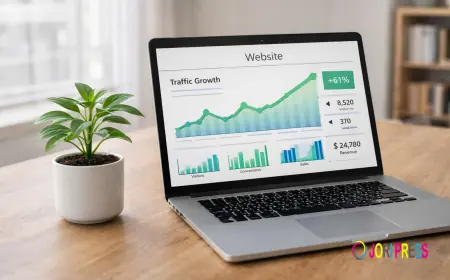Best Odoo ERP Software for Businesses in 2025
Discover how Odoo ERP software streamlines operations, boosts efficiency, and offers cost-effective solutions for businesses of all sizes.

Odoo ERP software is one of the most powerful and affordable solutions available today, helping businesses streamline operations and accelerate growth.
In today’s competitive market, companies are constantly searching for ways to simplify operations, cut unnecessary costs, and improve overall efficiency. Enterprise Resource Planning (ERP) software has become the backbone of modern businesses because it centralizes processes like sales, inventory, finance, customer management, and supply chain into a single system.
Out of the many ERP platforms in the market, Odoo has earned attention for being both cost-friendly and highly adaptable. Unlike traditional ERP giants like SAP or Oracle, Odoo is designed with small and medium-sized businesses (SMEs) in mind, making it accessible without compromising on features. Its modular approach allows companies to start small and add applications as they grow, giving unmatched scalability and adaptability
Why Odoo ERP Software is the Right Choice
Odoo provides both a Community version at no cost and an Enterprise version designed with enhanced capabilities and support services. This dual model makes Odoo ERP software unique — businesses can begin with the community version to minimize costs and later switch to enterprise when they need more advanced features.
Key reasons why companies prefer Odoo ERP software include:
Cost-effectiveness → Lower licensing and implementation costs compared to SAP or Oracle.
Flexibility → Modular structure covering everything from sales and inventory to HR and e-commerce.
Integration power → Smooth integration with third-party apps such as WooCommerce, Shopify, and payment gateways.
User-friendly design → Clean interface that is easier to adopt than many traditional ERP tools.
Scalability → Suitable for startups as well as enterprises, allowing growth without system changes.
Odoo ERP software in Different Industries
What sets Odoo ERP software apart is its flexibility—it can serve businesses across retail, manufacturing, healthcare, and beyond without losing efficiency. From retail to manufacturing and even healthcare, Odoo can be shaped to fit the unique needs of each industry. Let’s explore how:
1. Retail and E-commerce
From tracking product availability to managing orders and customer communication, Odoo simplifies daily operations for retail and e-commerce businesses. By connecting Odoo with platforms like Woocommerce or Shopify, companies can manage online orders, stock updates, and invoicing directly within Odoo. This not only saves time but also eliminates errors caused by manual updates.
2. Manufacturing
Manufacturing companies require strict control over production cycles, raw materials, and supply chain. Odoo’s Manufacturing (MRP) app provides features like bill of materials (BOMs), work center tracking, and quality checks. It ensures transparency across the entire production line and helps reduce delays, wastage, and costs.
3. Healthcare
Clinics and medical institutions must manage sensitive information along with challenging scheduling requirements. Odoo ERP software can manage patient records, appointment bookings, and even billing, ensuring compliance and efficiency. By connecting with accounting and HR modules, Odoo makes it easier to oversee both workforce management and financial operations in one place.
4. Wholesale and Distribution
For wholesale businesses, Odoo makes it easier to track purchase orders, warehouses, and delivery schedules. Automated workflows keep stock levels updated and improve accuracy in demand forecasting.
5. Fashion & Apparel
In fashion and apparel, product variations (sizes, colors, styles) can get complicated. Odoo ERP software handles product variants efficiently and links them with sales and inventory for smoother operations. Businesses can also integrate Odoo with their online stores to manage seasonal demand and marketing campaigns.
6. Electronics and Technology
Electronics companies often deal with after-sales service and warranty claims. Odoo’s support and service management modules help businesses track repairs, replacements, and customer support cases efficiently.
Odoo ERP software vs Other ERP Solutions
When businesses compare Odoo ERP software with traditional ERPs like SAP, Oracle, or even cloud-based platforms like Zoho and NetSuite, Odoo often comes out on top for SMEs.
Zoho ERP → Budget-friendly and easy to start with, but its customization depth is limited compared to larger platforms.
NetSuite ERP → A solid cloud-based solution offering good scalability, though the licensing costs can be on the higher side.
SAP & Oracle → Feature-rich and enterprise-grade, but their pricing and complexity often suit global corporations more than small or mid-sized companies.
Odoo ERP software → Provides an ideal middle ground—affordable, flexible, and highly customizable, making it a strong fit for businesses of all sizes.
This makes Odoo especially attractive to growing companies that need enterprise-grade features without enterprise-grade expenses.
Benefits of Implementing Odoo ERP Software
Beyond industry-specific advantages, Odoo provides universal benefits that apply to nearly every business:
Centralized Data → All business operations, from sales to HR, are managed in one system.
Improved Decision Making → Real-time reporting and analytics give managers insights for better strategies.
Automation → Reduces manual work in tasks like invoicing, stock updates, and purchase orders.
Scalability → Businesses can start with basic apps and expand as they grow.
Integration Ready → From WooCommerce connectors to Google Sheets integration, Odoo makes data flow smoother across platforms.
Why Businesses Are Moving Toward Odoo in 2025
The ERP market is evolving, and businesses today don’t want bulky, overpriced systems that take years to implement. Odoo ERP software offers agility, affordability, and customization that matches modern business needs.
Especially for e-commerce businesses, the ability to integrate with WooCommerce or Shopify makes Odoo a go-to ERP solution. Retailers, manufacturers, healthcare providers, and even service companies are switching to Odoo because it grows with them — something traditional ERPs cannot provide without heavy costs.
Conclusion
In 2025, companies that want a smart, scalable, and affordable ERP solution are choosing Odoo ERP software. Its ability to adapt across industries, integrate with platforms like WooCommerce, and offer flexibility at a reasonable cost makes it one of the best ERP choices available.
For startups, SMEs, and even large organizations, Odoo is not just software — it’s a complete business solution that empowers teams to streamline operations, reduce manual work, and make smarter decisions. Unlike many traditional ERP systems that are rigid and costly, Odoo adapts to the size and requirements of any business. A small startup can begin with just the basic apps such as invoicing, CRM, or inventory, while a growing mid-sized company can add modules like HR, accounting, and eCommerce as their needs expand. Even large enterprises benefit from Odoo’s scalability, because it integrates diverse departments into a single, unified platform.
The real strength of Odoo lies in its ability to support growth and innovation at every stage. For a startup, it offers simplicity and affordability without forcing them into expensive commitments. For SMEs, Odoo provides flexibility to customize workflows and adapt quickly to market changes. And for large corporations, its enterprise-grade features and seamless integrations ensure efficiency across complex processes.
By choosing Odoo today, companies are not just investing in a tool for the present, but building a strong foundation for the future. The modular nature of the platform means businesses can start small, expand as they grow, and never worry about outgrowing their ERP. This future-ready approach helps organizations stay competitive, optimize costs, and continuously improve their operations. In the long run, businesses adopting Odoo position themselves for sustainable success, with the ability to scal up and innovate without disruptions.
What's Your Reaction?
 Like
0
Like
0
 Dislike
0
Dislike
0
 Love
0
Love
0
 Funny
0
Funny
0
 Angry
0
Angry
0
 Sad
0
Sad
0
 Wow
0
Wow
0

















































